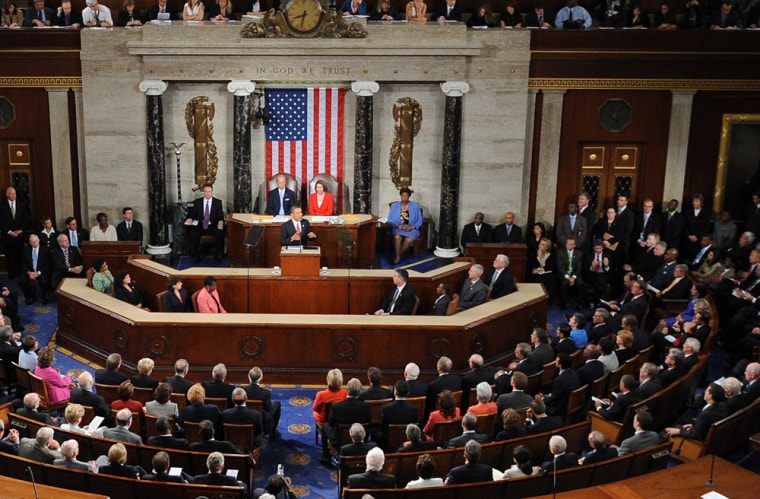Barack Obama faces the same obstacles that plagued former President Bill Clinton during a health care standoff 15 years ago. But Obama took a strikingly different path around them Wednesday night, choosing the promise of compromise over Clinton's sharp-edged veto pen.
For Clinton, the my-way-or-the-highway approach backfired. Republicans won control of Congress just 10 months later and health care fell from the public agenda, though Clinton himself recovered to win a second term.
For Obama, his strategy and presidency are intertwined in a gambit where voters who want pragmatism and bipartisanship — or at least the appearance of them — outnumber those, particularly from his liberal political base, who want the instant overhaul of the U.S. health care system Obama promised last year.
"The time for bickering is over," Obama told a joint session of Congress. "Now is the season for action."
Echoes of Clinton?
On the evening of Jan. 25, 1994, Clinton addressed a joint session of Congress to reclaim the political agenda. His first year in office had been sidetracked by issues inherited from former President Bush, including deficit reduction and the North American Free Trade Agreement.
Liberals were frustrated that a progressive revolution had not yet materialized under Clinton's watch. Even worse, Republican and Democratic skeptics alike wondered whether he had the stomach for a fight.
Clinton responded that night 15 years ago by brandishing a pen and declaring: "If you send me legislation that does not guarantee every American private health insurance that can never be taken away, you will force me to take this pen, veto the legislation, and we'll come right back here and start all over again."
From that flourish of political arrogance followed every bad decision that doomed health care reform — a task force headed by his wife, Hillary Rodham Clinton, meeting in secret to craft a Byzantine plan with little congressional input.
It died upon arrival.
Voters viewed the 1994 fiasco as further evidence that Clinton, this new leader they otherwise liked, was not up to the job.
Clinton's story must sound frighteningly familiar to Obama. Fewer than eight months into his presidency, Obama sought Tuesday to reclaim the initiative after getting bogged down by issues left over by Bush's son — an epic economic collapse and a soaring budget deficit, among them.
His liberal supporters are demanding action on not just health care reform, but also on gay rights, pro-labor legislation and climate change.
Is Obama tough enough?
And there's the question on the lips of supporters and opponents alike: Is Obama tough enough? Nobody fears him, certainly not now that his job approval numbers have tumbled from the stratosphere.
Obama's response? Rather than echo a Clinton ultimatum, Obama seems to be channeling a Republican president, Ronald Reagan, who lived by two rules of politics:
- Voters want politicians to work together
- Half a loaf is better than none.
Reagan often put forth a sweeping vision, cut a deal to get part of it done and used the bully pulpit to take credit for a full-out victory.
And here was Obama on Wednesday: Renewing his pledge to reform the nation's health care system, the president opened the door to partial victory and complete bragging rights.
"I will continue to seek common ground in the weeks ahead," Obama said. "If you come to me with a serious set of proposals, I will listen. My door is always open."
Obama knows there is no chance of having a truly two-party approach to health care reform, and only a slim chance of dragging more than two or three Republicans aboard a Democratic bill.
But he also knows — his pollsters surely have told him — that the public craves at least the appearance of bipartisanship.
An Associated Press-GfK poll released hours before his address shows that eight in 10 Americans say it's important that any plan that passes Congress have the support of both parties.
With that sentiment in mind, Obama praised GOP lawmakers and voiced support for some issues dear to conservatives.
Half a loaf or more
In the end, Obama has a good shot at getting a half of a loaf or more on health care. Despite a rocky summer that left his job approval rating at 50 percent, he has still has the support of nearly every special interest group including many that fought Clinton on health care.
Democrats are united behind the broad and popular principles espoused by Obama, including consumer protections, subsidies for the working poor and some semblance of cost controls.
The truth is Obama has never been a big believer in insisting that people have the option of a government-run insurance plan, a notion strongly backed by liberal activists.
Would he take it? Sure. But he won't fight to the death like Clinton did.
"The public option is only a means to an end," Obama said.
Why wave a veto pen when Obama can make a pass at bipartisanship and declare victory over whatever Democrats muscle through Congress? He's a good politician, and knows it.
Obama must figure he can surely make a half a loaf look like a bakery.
